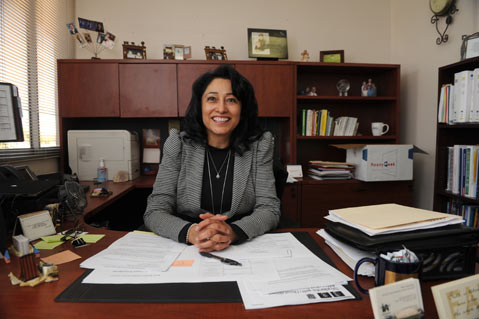No Pain, No Gain
New Special Ed Administrator Takes Over Embattled Department

At an elementary school in the rural upper reaches of L.A. County, a girl is standing erect, her pupils dilating on the expansive green mass an inch away. She has been punished by her teacher for having the gall to ask for a clarification, so she must stand for an hour with her nose touching the chalkboard. A contributing factor to her punishment may be the fact that she is the only Latina in her class. In fact, her parents are the only brown property owners in the city of Palmdale. At this time, the 1960s, real estate agents refuse to sell to ethnic minorities. But Helen Rodriguez’s construction-worker father had been offered his boss’s house in a private sale.
A few days ago, surrounded by the accoutrements that personalize an office — a calendar with an illustration of Jesus, a coffee mug filled with mints from Sizzler, and a placard with a Martin Luther King Jr. quote that reads “Faith is taking the first step even when you don’t see the staircase” — the adult version of that girl recalls thinking, “I will never treat a child like that when I’m a teacher.” In January, Rodriguez took over as the assistant superintendent of Special Education for the Santa Barbara school district. She is the latest addition to a cabinet that is now almost entirely selected by Superintendent David Cash, under whom Rodriguez worked for two years in the Fullerton district.
And her sense of empathy for marginalized students will come in handy because, of all the challenges to running a public school system in California, none may be so insurmountable as maintaining a functional special education department. Districts are saddled with unfunded mandates, qualified administrators are hard to come by, teachers are undertrained, and parents often feel underserved. An outside consultant issued a withering report on systemic problems with the district’s Special Ed program in 2009. Those problems have been addressed, but Santa Barbara has seen a revolving door of administrators.
And just this past November, an administrative law judge ordered the district to provide its faculty with six hours of training on “child find,” the process of identifying students with learning disabilities. It was part of a ruling in which the judge found that a student was not provided a “free and appropriate public education” during the 2010-2011 school year. “The evidence established that most District personnel had not received significant child find training since they obtained credentials. And even those who had recently received that training still had mistaken ideas of what their individual obligations were as educational professionals as they relate to the District’s child find duties,” wrote the judge.
Rodriguez agreed that teachers could use more training as any professional needs to continue their education. And she also said she understands the frustrations of parents; she has a dyslexic son who was not diagnosed until third grade. So she had to walk that fine line of prodding her son’s school without becoming adversarial. She is holding parent-training workshops to educate parents on how to best cooperate with the district. Just before spring break, she hosted one on the Individualized Educational Program (IEP) process whereby a plan is constructed to address the needs of special-education students. Next year, she plans on holding monthly meetings with parents.
She says things like, “I will not sell out a child to pay my mortgage.”
Rodriguez has led a peripatetic, upwardly mobile career, starting as a bilingual elementary school teacher. A devout Mormon, Rodriguez emphatically repeats that, despite her ambition, no material reward can trump her treatment of a child or the judgment of her maker. She says things like, “I will not sell out a child to pay my mortgage.” After earning her special-education credential, she taught a day class at Southgate High School in Los Angeles, where she later learned her students had bet she would quit within two weeks. What she found was that most of her students were wrongly classified, and she earned the ire of the school psychologist, who could not keep up with the special-education exit paperwork as she continually referred students. It was at that school where an assistant principal suggested she pursue administration, a path that led her, eventually, to Santa Barbara.
Rodriguez noted that she was attracted to the job here not only because it was a step up from her previous position in San Bernardino, and not only because it was a chance to reconnect with her old boss, but also because of its high number of English learners. If they are not provided intensive reading and writing instruction, they will likely end up in special education within two years of being reclassified as English proficient, she said. Tinted by her own experience growing up as a Spanish speaker, Rodriguez said she has always taught kids not to pull out the race card — even when warranted — but to be resilient and positive. Toward those who treat her differently due to race, she said, “I learned how to be civil with dignity and not lose respect. If they don’t want to be my friend … then they lost out.”
This method of stubborn positiveness, Rodriguez said, was also useful in the classroom. Even with the most hopeless, drug-addicted students, she said, “You have to keep building them up” and maybe one day they will realize that somebody believed in them. For the business of special education is “saving lives,” Rodriguez is apt to say. Case in point, she said, is the Sandy Hook massacre, which was “a miscarriage of justice in special education.” Whether Rodriguez and her staff can make parents feel like that attitude is being translated to their individual children will go a long way to answering whether she can stabilize special education in Santa Barbara.



